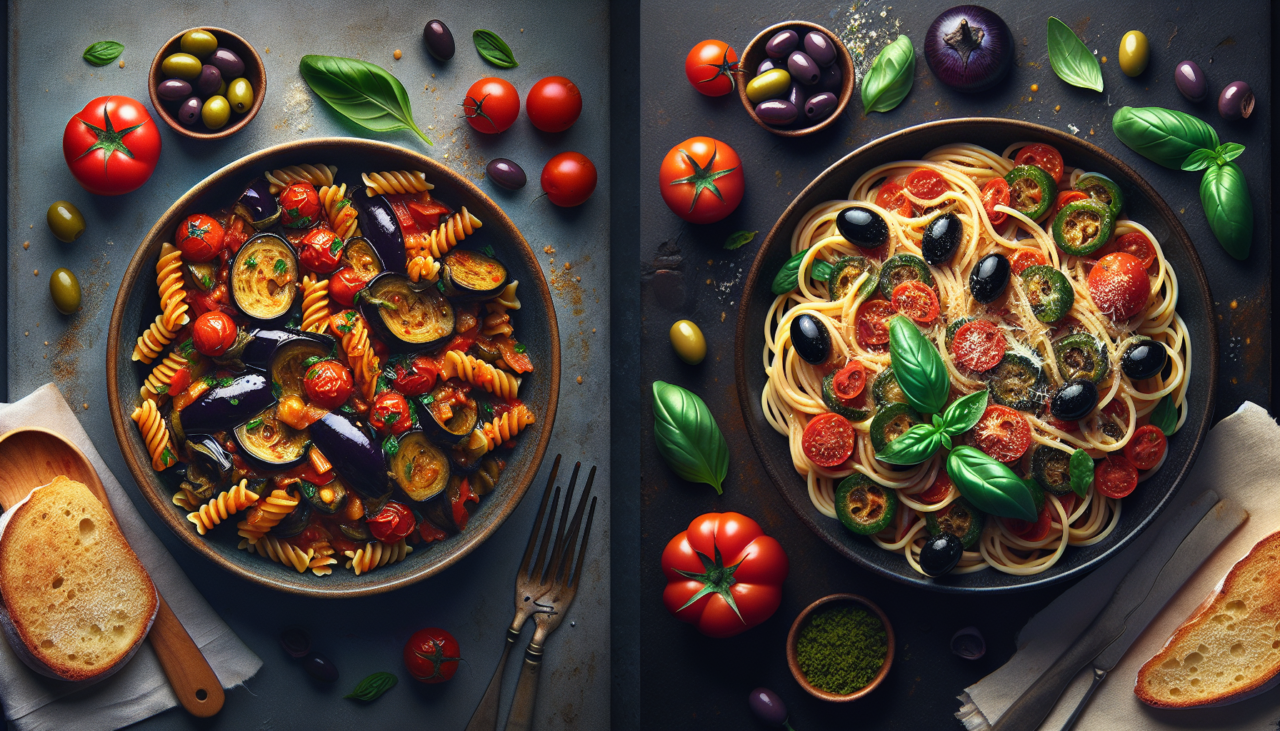Have you ever wondered which version of Caponata pasta is the best for a quick and satisfying meal? This mouthwatering dish, with its roots in Sicilian cuisine, brings together a medley of fresh vegetables, savory flavors, and hearty pasta. With the growing popularity of vegetarian meals, we’re diving into two remarkable, simple vegetarian recipes for Caponata pasta that you can whip up in a jiffy!
Individual Recipe Summaries
Caponata Pasta from BBC Good Food
The BBC Good Food recipe showcases a traditional yet straightforward approach to crafting Caponata pasta. The primary ingredients include:
- Eggplant
- Bell peppers
- Zucchini
- Tomatoes
- Pasta of your choice
This recipe stands out by incorporating balsamic vinegar and olives, adding a robust flavor that complements the sweetness of the vegetables. The preparation method is simple but effective; the vegetables are sautéed until tender and then combined with cooked pasta, creating a warm, comforting dish perfect for busy weeknights.
Vegan Caponata Pasta from Vegan Cocotte
The Vegan Cocotte’s Caponata pasta offers a delightful vegan twist on the classic recipe, maintaining the same vibrant flavors while ensuring it’s fully plant-based. Key ingredients include:
- Eggplant
- Cherry tomatoes
- Capers
- Olive oil
- Pasta
This version excels with the addition of capers, which provide a salty, tangy punch that brightens the dish. The recipe emphasizes using fresh, seasonal vegetables and includes instructions on how to roast the eggplant to enhance its natural flavors, which makes it a fantastic option for those looking for a healthy, satisfying meal.
Recipe Comparison
When comparing these two simple vegetarian recipes, several key differences emerge that can help you decide which one to try first:
Ingredients
- The BBC Good Food recipe includes bell peppers and zucchini, while the Vegan Cocotte version features cherry tomatoes and capers, making the latter slightly more tangy.
- Both recipes utilize eggplant, a core ingredient in traditional Caponata, ensuring you’re embracing authentic Sicilian flavors.
Cooking Techniques
- BBC Good Food opts for sautéing the vegetables, which is quick and effective for a weeknight dinner.
- On the other hand, the Vegan Cocotte recipe recommends roasting the eggplant beforehand, providing a richer flavor and a unique texture.
Cooking Time
- Both recipes are simple and relatively quick to prepare, taking around 30-40 minutes, perfect for students and busy individuals.
Taste and Texture
- The flavor profile in the BBC Good Food version leans towards sweet and savory, thanks to the balsamic vinegar and olives.
- The Vegan Cocotte’s dish leans more towards tart and savory, thanks to the capers and fresh cherry tomatoes, giving it a distinct and refreshing edge.
Which Recipe Is Right for You?
If you’re a student looking for a vegetarian meal that’s quick to prepare, both recipes can suit your needs. The BBC Good Food version provides a classic, comforting taste, while the Vegan Cocotte option offers a healthier, tangier take on the classic Caponata pasta.
Ultimately, if you prefer a more traditional flavor, go for the BBC Good Food recipe. However, if you’re adventurous and enjoy a zesty punch from capers, the Vegan Cocotte version is a great pick. Both recipes are fantastic choices that celebrate the essence of Caponata while catering to your dietary preferences.
Conclusion
In summary, both Caponata pasta recipes deliver delicious flavors and satisfying textures, making them excellent vegetarian options. Whether you decide to embrace the classic approach or the modern vegan twist, you’re in for a treat!
Have you tried either of these recipes? Let us know in the comments which one you loved most or if you made any delicious tweaks of your own!
